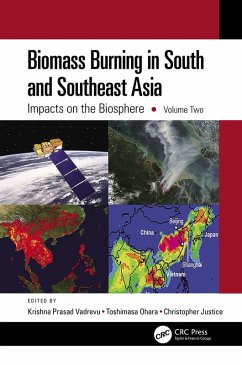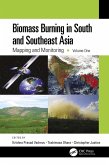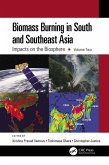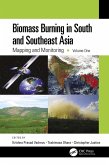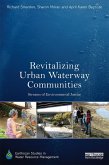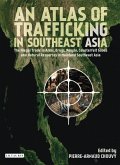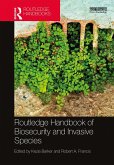Biomass Burning in South and Southeast Asia (eBook, ePUB)
Impacts on the Biosphere, Volume Two
Redaktion: Vadrevu, Krishna Prasad; Justice, Christopher; Ohara, Toshimasa
56,95 €
56,95 €
inkl. MwSt.
Sofort per Download lieferbar

28 °P sammeln
56,95 €
Als Download kaufen

56,95 €
inkl. MwSt.
Sofort per Download lieferbar

28 °P sammeln
Jetzt verschenken
Alle Infos zum eBook verschenken
56,95 €
inkl. MwSt.
Sofort per Download lieferbar
Alle Infos zum eBook verschenken

28 °P sammeln
Biomass Burning in South and Southeast Asia (eBook, ePUB)
Impacts on the Biosphere, Volume Two
Redaktion: Vadrevu, Krishna Prasad; Justice, Christopher; Ohara, Toshimasa
- Format: ePub
- Merkliste
- Auf die Merkliste
- Bewerten Bewerten
- Teilen
- Produkt teilen
- Produkterinnerung
- Produkterinnerung

Bitte loggen Sie sich zunächst in Ihr Kundenkonto ein oder registrieren Sie sich bei
bücher.de, um das eBook-Abo tolino select nutzen zu können.
Hier können Sie sich einloggen
Hier können Sie sich einloggen
Sie sind bereits eingeloggt. Klicken Sie auf 2. tolino select Abo, um fortzufahren.

Bitte loggen Sie sich zunächst in Ihr Kundenkonto ein oder registrieren Sie sich bei bücher.de, um das eBook-Abo tolino select nutzen zu können.
This book offers an interdisciplinary perspective on the impacts of biomass burning on environmental resources, climate, and the atmosphere. It gives several examples linking top-down remote sensing, bottom-up ground-based measurements, and an integrated modeling to address the impacts of biomass burning and land-atmosphere interactions.
- Geräte: eReader
- mit Kopierschutz
- eBook Hilfe
Andere Kunden interessierten sich auch für
![Biomass Burning in South and Southeast Asia (eBook, ePUB) Biomass Burning in South and Southeast Asia (eBook, ePUB)]() Biomass Burning in South and Southeast Asia (eBook, ePUB)55,95 €
Biomass Burning in South and Southeast Asia (eBook, ePUB)55,95 €![Biomass Burning in South and Southeast Asia (eBook, PDF) Biomass Burning in South and Southeast Asia (eBook, PDF)]() Biomass Burning in South and Southeast Asia (eBook, PDF)56,95 €
Biomass Burning in South and Southeast Asia (eBook, PDF)56,95 €![Biomass Burning in South and Southeast Asia (eBook, PDF) Biomass Burning in South and Southeast Asia (eBook, PDF)]() Biomass Burning in South and Southeast Asia (eBook, PDF)56,95 €
Biomass Burning in South and Southeast Asia (eBook, PDF)56,95 €![Biomass Burning in South and Southeast Asia, Two Volume Set (eBook, PDF) Biomass Burning in South and Southeast Asia, Two Volume Set (eBook, PDF)]() Biomass Burning in South and Southeast Asia, Two Volume Set (eBook, PDF)94,95 €
Biomass Burning in South and Southeast Asia, Two Volume Set (eBook, PDF)94,95 €![Revitalizing Urban Waterway Communities (eBook, ePUB) Revitalizing Urban Waterway Communities (eBook, ePUB)]() Richard SmardonRevitalizing Urban Waterway Communities (eBook, ePUB)34,95 €
Richard SmardonRevitalizing Urban Waterway Communities (eBook, ePUB)34,95 €![An Atlas of Trafficking in Southeast Asia (eBook, ePUB) An Atlas of Trafficking in Southeast Asia (eBook, ePUB)]() An Atlas of Trafficking in Southeast Asia (eBook, ePUB)88,95 €
An Atlas of Trafficking in Southeast Asia (eBook, ePUB)88,95 €![Routledge Handbook of Biosecurity and Invasive Species (eBook, ePUB) Routledge Handbook of Biosecurity and Invasive Species (eBook, ePUB)]() Routledge Handbook of Biosecurity and Invasive Species (eBook, ePUB)46,95 €
Routledge Handbook of Biosecurity and Invasive Species (eBook, ePUB)46,95 €-
-
-
This book offers an interdisciplinary perspective on the impacts of biomass burning on environmental resources, climate, and the atmosphere. It gives several examples linking top-down remote sensing, bottom-up ground-based measurements, and an integrated modeling to address the impacts of biomass burning and land-atmosphere interactions.
Dieser Download kann aus rechtlichen Gründen nur mit Rechnungsadresse in A, B, BG, CY, CZ, D, DK, EW, E, FIN, F, GR, HR, H, IRL, I, LT, L, LR, M, NL, PL, P, R, S, SLO, SK ausgeliefert werden.
Produktdetails
- Produktdetails
- Verlag: Taylor & Francis eBooks
- Seitenzahl: 342
- Erscheinungstermin: 23. Juni 2021
- Englisch
- ISBN-13: 9780429664052
- Artikelnr.: 61668149
- Verlag: Taylor & Francis eBooks
- Seitenzahl: 342
- Erscheinungstermin: 23. Juni 2021
- Englisch
- ISBN-13: 9780429664052
- Artikelnr.: 61668149
- Herstellerkennzeichnung Die Herstellerinformationen sind derzeit nicht verfügbar.
Krishna Prasad Vadrevu is a scientist at the NASA Marshall Space Flight Center, Huntsville, Alabama, USA. His current research is on remote sensing of land cover and land use change (LCLUC). He has 17 years of research experience and is interested in land-atmosphere interactions. He also serves as the lead scientist for NASA South/Southeast Research Initiative and coordinator for the NASA LCLUC program. Toshimasa Ohara is a scientist at National Institute of Environmental Studies, Tsukuba, Japan. He has 32 years of research experience in air quality modeling, emission inventories, and pollution research. He is a lead developer for Regional Emission Inventory in Asia (REAS) and currently interested in linking top-down and bottom- up approaches for emissions quantification. Christopher Justice is a full professor at the Department of Geographical Sciences, University of Maryland, College Park, USA. He has 38 years of research experience in remote sensing. His current research is on land cover and land use change, global fire, and global agricultural monitoring systems, all using remote sensing. He is the NASA LCLUC program scientist, member of MODIS science team, and global implementation lead for the GEO Global Agricultural Monitoring Task. He is also co-director for the center of Global Agricultural Monitoring and Research.
Section I Biomass Burning and Regional Air Quality Chapter 1 Impacts of Biomass and Garbage Burning on Air Quality in South/Southeast Asia Chapter 2 Biomass Burning and Their Impacts on Air Quality in Thailand Chapter 3 Impact of Biomass Burning on Local Air Quality in South China Chapter 4 Impact of Biomass Burning on Surface-Level Carbon Monoxide over Lahore and Karachi and Their Comparison with South Asian Megacities Section II Biomass Burning Emissions Chapter 5 Estimating Biomass Burning Emissions in South and Southeast Asia from 2001 to 2017 Based on Satellite Observations Chapter 6 Black Carbon Emissions from Biomass Burning in Southeast Asia
A Review Chapter 7 Satellite-Based Estimation of Global CO2 Emissions from Biomass Burning Chapter 8 Biomass Burning Mercury Emissions over the Maritime Continent Chapter 9 Biomass Burning Emissions in Indonesia and Policy Measures
An Overview Chapter 10 PM2.5 Emissions from Biomass Burning in South/Southeast Asia
Uncertainties and Trade-Offs Chapter 11 Greenhouse Gas and Particulate Matter Emissions from Rice Residue Burning in Punjab and Haryana States of India Section III Aerosol Pollution and Biomass Burning Chapter 12 Biomass Burning and Impacts on Aerosols: Optical Properties and Radiative Effects Chapter 13 Remotely Sensed Particulate Matter Estimation in Malaysia during the Biomass Burning Season in Southeast Asia Chapter 14 Impacts of Smoke Aerosols over Northern Peninsular Southeast Asia: Results from 7-SEAS Campaigns Chapter 15 Temporal Variation and Source Apportionment of PM2.5 Constituents in Phuket, Thailand Chapter 16 Impacts of Biomass Burning Aerosols on Air Quality and Convective Systems in Southeast Asia Chapter 17 Biomass Burning Influence on PM2.5 Regional and Long- Range Transport in Northeast Asia Chapter 18 Estimation of PM10 Concentrations from Biomass Burning and Anthropogenic Emissions Using the WRF
HYSPLIT Modeling System
A Review Chapter 7 Satellite-Based Estimation of Global CO2 Emissions from Biomass Burning Chapter 8 Biomass Burning Mercury Emissions over the Maritime Continent Chapter 9 Biomass Burning Emissions in Indonesia and Policy Measures
An Overview Chapter 10 PM2.5 Emissions from Biomass Burning in South/Southeast Asia
Uncertainties and Trade-Offs Chapter 11 Greenhouse Gas and Particulate Matter Emissions from Rice Residue Burning in Punjab and Haryana States of India Section III Aerosol Pollution and Biomass Burning Chapter 12 Biomass Burning and Impacts on Aerosols: Optical Properties and Radiative Effects Chapter 13 Remotely Sensed Particulate Matter Estimation in Malaysia during the Biomass Burning Season in Southeast Asia Chapter 14 Impacts of Smoke Aerosols over Northern Peninsular Southeast Asia: Results from 7-SEAS Campaigns Chapter 15 Temporal Variation and Source Apportionment of PM2.5 Constituents in Phuket, Thailand Chapter 16 Impacts of Biomass Burning Aerosols on Air Quality and Convective Systems in Southeast Asia Chapter 17 Biomass Burning Influence on PM2.5 Regional and Long- Range Transport in Northeast Asia Chapter 18 Estimation of PM10 Concentrations from Biomass Burning and Anthropogenic Emissions Using the WRF
HYSPLIT Modeling System
Section I Biomass Burning and Regional Air Quality Chapter 1 Impacts of Biomass and Garbage Burning on Air Quality in South/Southeast Asia Chapter 2 Biomass Burning and Their Impacts on Air Quality in Thailand Chapter 3 Impact of Biomass Burning on Local Air Quality in South China Chapter 4 Impact of Biomass Burning on Surface-Level Carbon Monoxide over Lahore and Karachi and Their Comparison with South Asian Megacities Section II Biomass Burning Emissions Chapter 5 Estimating Biomass Burning Emissions in South and Southeast Asia from 2001 to 2017 Based on Satellite Observations Chapter 6 Black Carbon Emissions from Biomass Burning in Southeast Asia
A Review Chapter 7 Satellite-Based Estimation of Global CO2 Emissions from Biomass Burning Chapter 8 Biomass Burning Mercury Emissions over the Maritime Continent Chapter 9 Biomass Burning Emissions in Indonesia and Policy Measures
An Overview Chapter 10 PM2.5 Emissions from Biomass Burning in South/Southeast Asia
Uncertainties and Trade-Offs Chapter 11 Greenhouse Gas and Particulate Matter Emissions from Rice Residue Burning in Punjab and Haryana States of India Section III Aerosol Pollution and Biomass Burning Chapter 12 Biomass Burning and Impacts on Aerosols: Optical Properties and Radiative Effects Chapter 13 Remotely Sensed Particulate Matter Estimation in Malaysia during the Biomass Burning Season in Southeast Asia Chapter 14 Impacts of Smoke Aerosols over Northern Peninsular Southeast Asia: Results from 7-SEAS Campaigns Chapter 15 Temporal Variation and Source Apportionment of PM2.5 Constituents in Phuket, Thailand Chapter 16 Impacts of Biomass Burning Aerosols on Air Quality and Convective Systems in Southeast Asia Chapter 17 Biomass Burning Influence on PM2.5 Regional and Long- Range Transport in Northeast Asia Chapter 18 Estimation of PM10 Concentrations from Biomass Burning and Anthropogenic Emissions Using the WRF
HYSPLIT Modeling System
A Review Chapter 7 Satellite-Based Estimation of Global CO2 Emissions from Biomass Burning Chapter 8 Biomass Burning Mercury Emissions over the Maritime Continent Chapter 9 Biomass Burning Emissions in Indonesia and Policy Measures
An Overview Chapter 10 PM2.5 Emissions from Biomass Burning in South/Southeast Asia
Uncertainties and Trade-Offs Chapter 11 Greenhouse Gas and Particulate Matter Emissions from Rice Residue Burning in Punjab and Haryana States of India Section III Aerosol Pollution and Biomass Burning Chapter 12 Biomass Burning and Impacts on Aerosols: Optical Properties and Radiative Effects Chapter 13 Remotely Sensed Particulate Matter Estimation in Malaysia during the Biomass Burning Season in Southeast Asia Chapter 14 Impacts of Smoke Aerosols over Northern Peninsular Southeast Asia: Results from 7-SEAS Campaigns Chapter 15 Temporal Variation and Source Apportionment of PM2.5 Constituents in Phuket, Thailand Chapter 16 Impacts of Biomass Burning Aerosols on Air Quality and Convective Systems in Southeast Asia Chapter 17 Biomass Burning Influence on PM2.5 Regional and Long- Range Transport in Northeast Asia Chapter 18 Estimation of PM10 Concentrations from Biomass Burning and Anthropogenic Emissions Using the WRF
HYSPLIT Modeling System
